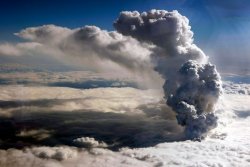 Airline flights to, from, and within northern Europe have been cancelled today because of fears that a vast cloud of volcanic ash spreading from an Iceland volcano could bring down passenger planes (see map of northern Europe).
Airline flights to, from, and within northern Europe have been cancelled today because of fears that a vast cloud of volcanic ash spreading from an Iceland volcano could bring down passenger planes (see map of northern Europe). Airline flights to, from, and within northern Europe have been cancelled today because of fears that a vast cloud of volcanic ash spreading from an Iceland volcano could bring down passenger planes (see map of northern Europe).
Airline flights to, from, and within northern Europe have been cancelled today because of fears that a vast cloud of volcanic ash spreading from an Iceland volcano could bring down passenger planes (see map of northern Europe).
British airports are completely closed to civilian aircraft following latest eruptions from the Eyjafjallajökull volcano. (Pictures: Iceland Volcano Erupts, Under Ice This Time.)
Thousands of flights have likewise been cancelled to and from Norway, Sweden, Finland, and Denmark as affected countries close airspace in response to the volcanic cloud, which is currently drifting at altitudes of 25,000 to 30,000 feet (7,620 to 9,140 meters).
Infrared Video: Eyjafjallajökull Volcano Spews Ash, April 14
(30 seconds)
Why Volcanic Ash Endangers Flights
Aviation authorities have taken the highly unusual measure because tiny particles of rock, glass, and sand in the volcanic ash cloud could potentially jam jet engines.
"It's been long established that flying through volcanic ash is a very dangerous safety risk," said Richard Taylor, a spokesperson for the U.K. Civil Aviation Authority.
He cites the example of a British Airways Boeing 747 that lost all four engines after flying into volcanic ash over Indonesia in 1982.
"The engines fortunately restarted, but it's clearly a very dangerous thing to do," Taylor said.
Video: Volcanic Iceland
(2½ minutes, starting with 15-second advertisement)
Volcanic Ash Double Threat to Airline Engines
"Combustion engines work through sucking in air, and that's what generates the power," Taylor added.
"Volcanic dust can get into the minute parts of an aircraft engine and cause all sorts of damage. Like a car driving through a sandstorm, it's going to clog up the engine's internal parts."
In addition, the tiny airborne particles in volcanic ash can clog devices called pitot tubes, which act as airspeed sensors.
"They can get blocked up with ash and give the aircraft false readings," Taylor said. "The aircraft can stall and the pilot might not know what speed it's going."
Flights Grounded for How Long Due to Volcanic Ash?
Thursday's decision to cut all civilian flights over Britain due to the volcanic ash was taken by NATS (formerly called the National Air Traffic Services), which has responsibility for the country's airspace corridors.
"No flights other than agreed emergencies are currently permitted," NATS said in statement. The air traffic organization added that "it is very unlikely that the situation over England will improve in the foreseeable future."
The U.K.'s Met Office, the national weather agency, is monitoring the spread of the volcanic ash cloud via its Volcanic Ash Advisory Centres.
Current forecasts suggest the volcanic ash cloud will remain over the U.K. until the weekend, though the ash looks set to remain at high altitudes so will likely have drifted away from the U.K. before it begins falling from the sky, experts say.
"I understand the volcano is still erupting," Taylor, of the U.K. Civil Aviation Authority, said. "This could go on for a number of days."